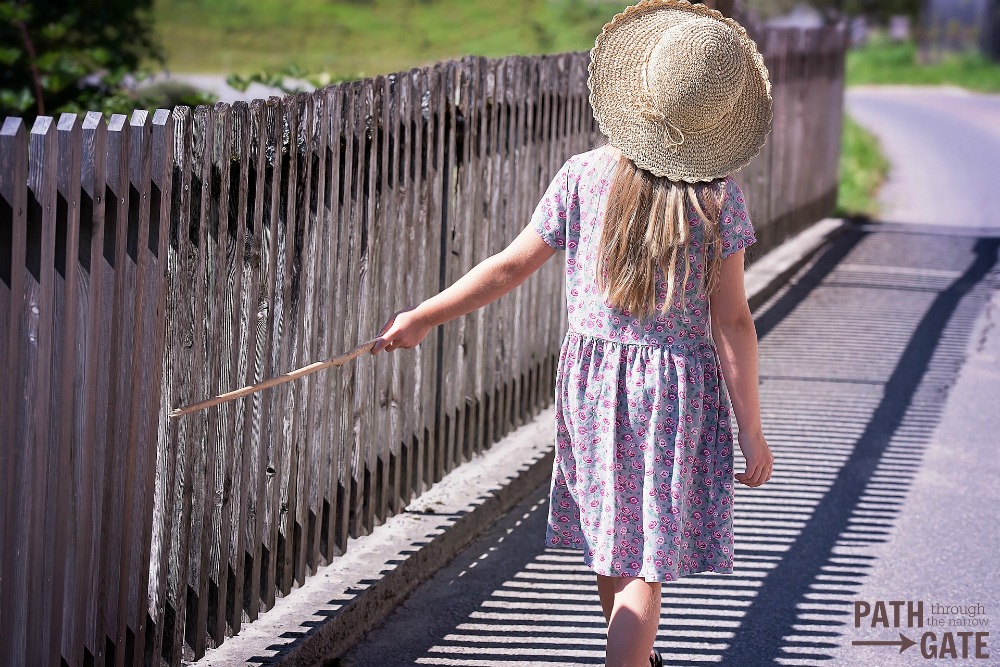“I want to go to heaven, but I don’t know if I really believe in God. What if the Bible is not true? What if God’s not real?”
My sweet little seven year old daughter was looking up at me with her big blue eyes, waiting for my answers.

But, I didn’t have any answers. My heart was crushed by worry, fear, and disappointment.
I was NOT READY for my daughter to start asking these questions.
After all, she had already asked Jesus into her heart when she was five.
What was going on? Why was she suddenly questioning everything?
Have your kids ever come to you questioning your faith? It can be a terrifying experience. But, here are some truths that we need to remember when our children question God:
Four Truths to Remember When Our Children Question God
As Christian parents, we love our children with immeasurable love. We try to protect them from the “big, bad, world” in any way that we can. We teach our children about God. We strive to saturate their young hearts with the Bible.
Then, we are shocked when our children start to question the things that we have taught them.

It is easy for us as Christian parents to forget four important truths:
1. Our children are not born saved.
2. We cannot do the work of the Holy Spirit in their tiny hearts. We cannot save our children.
3. Their questions are not a personal rejection of us as their parents.
4. Our children’s questions and doubts may actually be a good thing.
How Can My Children’s Questions and Doubts Be a Good Thing?
You have probably taught your children the importance of brushing their teeth. Your preschoolers and elementary aged children may balk a bit, but you stand firm and make them brush their teeth. It becomes a habit.

However, at some point your children have to decide for themselves that brushing their teeth is a good thing. Otherwise, when they leave home and get their first apartment, they will stop brushing their teeth.
Some kids are going to give you a harder time about this than others. “Mom, do I HAVE to brush my teeth? WHY do I always have to brush my teeth?” These questions give you an opportunity to explain the health and social benefits of good oral hygiene. Other kids will never really question.
Each child, whether a questioning child or a silent child, must in their own minds decide whether they will accept your wisdom and make this chore their own habit, or reject it.
Furthermore, this teaching may need to be addressed multiple times as your child grows. When they are toddlers, they might accept the importance of brushing their teeth because they see mommy brushing her teeth. As they become older, they might do it because they went on a school field trip to the dentist’s office and saw a video about the importance of good oral care. When they become teenagers, they might again question the importance of oral hygiene – until someone teases them about their bad breath.
At some point, our children have to decide for themselves that clean teeth and fresh breath is something that they themselves value.

In the same way, our children must decide for themselves whether they will make our faith their own faith. As they grow, they may question it in different ways at different times. That’s a normal part of growing up.
Rather than being shocked and upset, graciously give your child some room to question and grow.
When our children ask questions, it means that they are thinking independently about God. This is absolutely necessary for them to make the Christian faith their own.
They cannot absorb our faith. They must come to peace with God through the Holy Spirit’s working in their own hearts.

How Should Parents Respond to Their Children’s Doubts?
We are called to be faithful parents, teaching our children the truth. Our children are called to respond to it. Our children’s salvation is ultimately between them and God.
If your children are bringing their questions to you, it means that they trust you. They are looking for answers. Don’t condemn them for their lack of faith, act shocked, or grieved. Instead, be willing to talk to them about their doubts in a nonjudgmental way. Strive to keep communication open between you and your child.
“Mommy, what if God’s not real?”
When your children come to you with questions and doubts, take a deep breath. Pray like crazy, and give your kids room to talk, explore, and grow. Let God do a work in their hearts!
May God bless you!


Let them choose what religion they want. If they believe in the Christian God, cool. If they are atheist, good for them. If they believe in multiple Gods, nice. It's ultimately their decision.
I don’t think wondering if God is real is comparable to not understanding the importance of brushing one’s teeth. Children sometime’s avoid brushing their teeth because they don’t like it or it’s not important to them yet.
I don’t believe children wonder if God is real because it’s unimportant to them or they think church is boring. I wondered this all the time as a child and it was the most important question to me. When I asked my parents, they never gave me a satisfying answer. I was terrified. I couldn’t make myself believe in God and I feared hell.
I don’t think having them make a habit of praying and reading The Bible will change that they want some evidence before believing. They want to know why you think The Bible is true. Just my two cents.
That is a great point, Wendy. Thank you for sharing it! Do you think that if your parents had shared some apologetics, as in why believing in God makes logical sense and why God’s Word is unlike any other book, would have helped you as a child?
It probably would have satisfied me for a while. To be honest, I never found enough proof. I ultimately turned to the internet to confirm Christianity for myself but I never found any apologetic arguments convincing enough. I always felt so guilty for not believing and had nightmares about hell. Just letting go and not trying to force myself to believe when I just couldn’t has been very liberating. It’s been four years and I haven’t told my mom because she’d just die. Sorry to come in with a downer story. But I do think you’re a great mom for letting your kids talk to you about this. Letting them be open and answering their questions the best thing you can do!
These are awesome! I teach 12 – 14 year olds and they have really enjoyed a little bit of healthy competition with these Sermon notes and it gives them a reason to pay attention and learn from the services.
Thanks for sharing that, Ingrid! I appreciate your encouragement and your work with these precious young people. May God bless you!